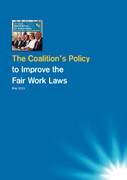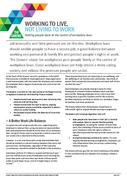
INDUSTRIAL RELATIONS relations policy is always a major issue in Australian election debate. 2013 will be no different. This time around the politics of industrial relations policy requires a balancing act for all parties.
The Coalition needs to demonstrate to business that it will take a significantly different approach to the existing policies of the Labor Government.
At the same time it does not want industrial relations to be an issue during the campaign and especially does not want its policy to be compared to the Howard Government’s “WorkChoices” policy.
The thrust of Tony Abbott’s IR policy is aimed at further eroding the power and influence of trade unions while not seeking to make any substantial changes to individual employment rights that exist under the existing FairWork Act. This includes maintaining existing restrictions around individual contracts and preserving the safety net of minimum entitlements. Small business are offered little more than improved information services.
Labor would be happy for industrial relations to feature in the campaign. On the issue of protecting workers rights it enjoys a strong lead over the Coalition in terms of which party is better at handling. But Labor has its own balancing act. The ALP does not want to be seen as going too far on industrial regulations thereby provoking further attacks from business. Conversely, the union movement still believes Labor has not done enough to roll back the WorkChoices era reforms and wants further changes, particularly around secure employment.
The Greens have by far the most interventionist IR policy. But the Greens have their own balancing act as well, with some of their policies potentially unattractive to their middle class supporters, particularly those in small business.
SUMMARY OF POLICY DIFFERENCES
|
ISSUE |
LABOR |
COALITION |
GREEN |
|---|---|---|---|
|
Trade off penalty rates and leave |
No. |
Yes. As long as the pass a “Better off overall test” |
No. |
|
Australian Building and Construction Commission (ABCC) |
No change – keep the Fair Work Construction unit |
Reinstate with full powers. |
Remove any coercive powers. One set of laws for all workers. |
|
Registered Organisations Commission |
Not supported. |
Will establish as a watchdog on unions and employer associations. |
Not supprted |
|
3-month time limit on the negotiation of Greenfields agreements. |
Not supported. |
Support. Needed to stop another “Wonthaggi” |
Not supported. |
|
WorkChoices |
The Coalition will “resurrect, rebadge and reinstate” |
“Dead, buried, cremated.” |
The Greens will wind back those elements that have been maintained by Labor |
|
Individual Flexibility Arrangements |
No change |
Increase their use in enterprise bargaining agreements. |
No change. |
|
Five weeks annual leave |
Not supported |
Not supported |
Support |
|
Nationally consistent industrial manslaughter laws |
Not supported |
Not supported |
Support |
|
Mandated shorter standard working hours |
Not supported |
Not supported |
Support |
|
Union right of entry |
No change |
Tougher restrictions |
Strengthen right of entry rights |
THE POLICY DETAIL — LABOR
Labor’s industrial relations policy has been developed in three main stages: the release of the Fair Work Act in 2009 under then Minister Julia Gillard and a two tranche response to the two year review of the Act under Minister Bill Shorten. Further changes were made to IR laws in response to scandalous revelations about the HSU as well as some changes around the intersection of IR and superannuation policy.
Fair Work Act 2009
The original Fair Work Act, legislated in 2009, attempted to shift the focus back to collective bargaining and reintroduce robust minimum standards.
The key elements of the 2009 reforms were:
- It ended the ability of employers to force individual contracts (Australian Workplace Agreements or AWA’s) with limited protections onto employees.
- Stronger protections under unfair dismissal laws and a wider range of employees covered.
- A stronger independent umpire to resolve disputes, Fair Work Australia.
- A new safety net of ‘National Employment Standards’
- More collective bargaining rights, including a requirement to bargain in good faith
- More rights to union membership and representation.
- Abolition of the Australian Building Control Commission (ABCC) and the creation of a new agency, Fair Work Building and Construction.
Two Year Review of the Fair Work Act – Tranche 1, August 2012
A Review Panel produced a two-year review of the Fair Work Act, Towards More Productive Equitable Workplaces: An Evaluation of the Fair Work Legislation. The report was delivered in 2012 and included 51 recommendations.
The government announced it would initially adopt 17 of the recommendations. The first tranche of alterations were passed by the parliament in November 2012: The amendments were mostly administrative and technical in nature. Some changes of significance included:
- Prohibiting the inclusion of “opt-out” clauses in enterprise agreements, requiring an employer to issue a notice of employee representation rights at the start of a bargaining period, minor amendments to the holding of secret ballots for protected action.
- Strengthen the power of the tribunal to dismiss unfair dismissal claims and award costs.
- Improve certain procedural aspects of agreement-making particularly award variation
- Establish an Expert Panel of the tribunal to be given new functions to review the appointment and performance of default superannuation funds in awards.
- The industrial relations tribunal, Fair Work Australia, had its name changed to the Fair Work Commission (FWC).
June 2012
- In response to revelations about the conduct of Health Services Union (HSU) new laws were introduced to improve the transparency and accountability of registered organisations and boost the powers of Fair Work Australia to investigate breaches of the Fair Work (Registered Organisations) Act and tripled penalties.
October 2012
- New transparent process for the FWC to determine which superannuation funds can be listed as default funds in modern awards, to bring greater contestability to the system and to protect the retirement savings of Australian workers who rely on the default contribution system.
Two Year Review of the Fair Work Act – Tranche 2, February 2013
A second tranche of amendments was announced in February 2013 arising from the two-year review. These changes involved:
- Measures to improve family flexibility such as:
- Extending the scope of the right to request flexible working arrangements to include carers, workers with disability, mature-aged workers, and workers experiencing domestic violence.
- Requirements for employers to genuinely consult with employees about changes to rosters and working hours, including the impact on their family life.
- Extending the time parents can take unpaid parental leave together from three weeks to eight weeks.
- An express right to request a return-to-work on a part-time basis after taking unpaid parental leave.
- Providing a worker who considers they have been bullied at work with a right to apply to the Fair Work Commission for an order to stop the bullying.
- Changes to right of entry laws to clarify where a permit holder may hold a meeting with employees on an employers premises and new powers for FWC to resolve disputes relating to the frequency of right of entry visits.
- Enable a worker who is bullied at work to apply to the FWC for an order to stop the bullying.
- In exercising its consideration of awards the FWC is required to provide additional remuneration for working overtime, shift work, weekends or public holidays, or unsocial, irregular or unpredictable hours.
June 2013
- Established the Centre for Workplace Leadership to promote innovation, productivity improvement and the future of workplaces.
THE POLICY DETAIL — THE COALITION
Policy to Improve the Fair Work Laws – May 2013
The Coalition released its IR policy in May 2013. The Coalition will retain the most important provisions contained in the Fair Work Act including:
- No individual workplace agreements (AWAs) with limited protections – this was the central plank of WorkChoices.
- Retention of the same minimum employment standards and penalty rates
- A “Better Off Overall Test” to protect workers from unscrupulous employers.
- Unfair dismissal protections and the general protection provisions in the Fair Work Act.
The Coalition has also promised to seek no further reforms – with the exception of any minor amendments and “house-keeping” amendments – for the remainder of its term of office.
The Coalition policy document contains 14 main initiatives:
- Keep and improve the Fair Work laws – including the independent umpire
- Re-establish the Australian Building and Construction Commission (ABCC)
- Provide better protection for members of Registered Organisations by more closely regulating the internal affairs of unions, and place greater external accountability and scrutiny on their affairs. Union officials will face the same fiduciary duties as company directors.
- Provide practical help to small business workplaces
- A guidebook called “Your First Employee”, offering “simple, plain English” advice for small business about hiring staff.
- A dedicated small business helpline to be established within the Office of the Fair Work Ombudsman.
- There will also be a smartphone or tablet App providing real-time information and assistance on wages and conditions for employees.
- Provisions to grant immunity from prosecution by the Fair Work Ombudsman for small business owners who mistakenly breach the conditions of the Fair Work Act.
- Guarantee workers the right to access fair flexibility by ensuring enterprise agreements can make further use of Individual Flexibility Arrangements (IFAs)
- Create realistic timeframes for Greenfield agreements (3 months)
- Introduce new provisions restricting union right of entry.
- Promote “harmonious, sensible and productive enterprise bargaining” by:
- Placing further restrictions on protected industrial action.
- Unions will be prevented from taking protected industrial action before any negotiations have taken place.
- FWC will have its powers extended to determine whether industrial action is unreasonable.
- Deliver a genuine paid parental leave scheme and lift female participation rates in Australian workplaces
- Ensure workplace bullying is comprehensively addressed using OH&S laws.
- Urgently review the Remuneration Tribunal for the trucking industry
- Give underpaid workers a better deal by ensuring workers who receive unpaid wages recovered by the Fair Work Ombudsman are paid interest on recovered wages.
- Rework the current provisions around Individual Flexibility Arrangements (IFAs) to remove the capacity of unions and employers to include restrictive IFA clauses. - subject to a “better off over all test”.
- A review of the Fair Work system to be undertaken by the Productivity Commission.
THE POLICY DETAIL — THE GREENS
The Greens released an update to their IR policy in November 2012. The Greens have the most interventionist IR policy with strong support for collective agreements, new laws on industrial manslaughter and measures to protect casual workers.
Employment and Workplace Relations Policy – November 2012
The Greens 39 point policy contains the following major commitments:
- Australia’s workforce must be highly skilled, highly trained and well-paid. The existence of a safety net and the right to collectively bargain are essential to achieving these aims.
- Working people have the right to be involved in decisions about their work, free of intimidation.
- The right to be a member of a union, to collectively bargain, to collectively withhold labour and collectively organise in the workplace are essential to achieving a sustainable and democratic future.
- Industrial manslaughter is a crime.
- Effective processes of dispute resolution, including conciliation and arbitration before an independent tribunal are a necessary element in any fair and effective industrial relations system.
- An industrial relations system that protects and enhances the rights of employees and workers by:
- legislating a minimum standard for pay, annual leave and hours of work that protects all employees and workers;
- providing comprehensive industry-wide awards that give rights and entitlements in excess of the legislative minima and which are determined by conciliation and arbitration before an effective and independent industrial tribunal;
- facilitating industry wide collective agreements that are union negotiated and exceed the Award standards;
- ensuring no workers are subject to laws and regulations detrimental to their interests on the basis of the industry in which they work;
- ensuring individual arrangements cannot be sub-standard compared with awards or collective agreements;
- conforming with international law, especially ILO conventions no. 87 on freedom of association and the right to organise (1948) and no. 98 on the right to organise and collective bargaining (1949).
- To require employers to:
- enter into collective agreements with their workforce unless a majority are demonstrably opposed to collective bargaining, with Fair Work Australia to have the power to arbitrate if no agreement can be reached; and
- inform new and existing employees that they are entitled to join a union, and enable the provision of information about the unions responsible for the sector and industry.
- Recognition of the rights of workers to take industrial action, including the right to strike, and to advance their economic and social and environmental interests. Workers themselves are best placed to determine how such industrial action is to be approved. Workers and their unions should be protected against sanctions under non-industrial laws (such as the Competition and Consumer Act 2010) or common law actions when undertaking legitimate industrial activity.
- Stronger right of entry rights for unions to recruit members, inspect for and remedy breaches of occupational health and safety provisions, breaches of the Fair Work Act and relevant awards or agreements, and other activities relating to strengthening workers’ organisations.
- Greater protection for casual, fixed term and probationary workers and employees of small businesses, including full rights to challenge termination of employment where it is unfair, with reinstatement to be the remedy except in exceptional circumstances.
- Reform of industrial laws and the portability of entitlements (such as long service leave) to reflect the growth in insecure employment and the fact that people are more likely to work for multiple employers during their working lives.
- A fairer sharing of paid work through mandated shorter standard working hours and a reversal of current trends towards increased unpaid overtime.
- Greater flexibility for employees in workplace arrangements to allow for a better balance between work and family, social and community involvement.
- Restriction of independent contractor arrangements to individuals who are genuinely running their own business and enhanced protection for individuals who are engaged under sham contractor arrangements and greater resources for prosecution of entities that engage sham contractors.
- To reinstitute a publicly owned employment service.
- To abolish and oppose any building and construction industry laws or codes that undermine working people’s collective and human rights, and the complete removal of any coercive powers over workers. One set of laws should apply equally to all workers.
- A legislated minimum of five weeks annual leave for all employees.
- The introduction of nationally consistent industrial manslaughter laws.
Analysis prepared by Nicholas Reece




